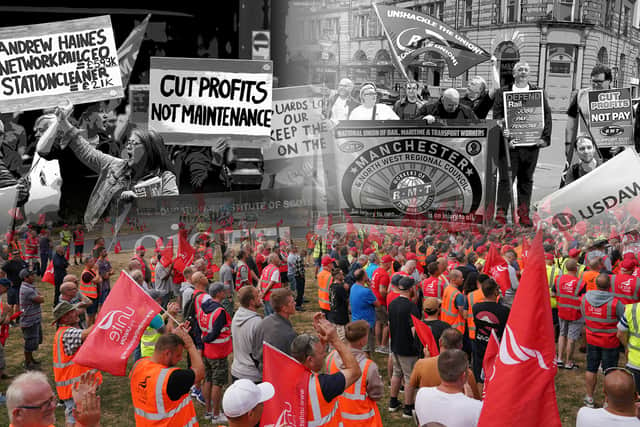UK strikes: do you get paid on strike, and what are your rights, does it impact pension, can anyone take part?
and live on Freeview channel 276
The UK is set to see a series of strike action as workers across a variety of industries stage walkouts this winter. It comes after council workers, barristers, rail staff and others have been carrying out strike action in recent months.
Public sector workers like many in the private sector are calling for significant pay rises so they do not face real-terms cuts, as inflation soars past 11%. Prime Minister Rishi Sunak has agreed to increase state pensions and benefits payments in line with inflation but has said nurses’ demand for a 19% hike is “unaffordable”.
Advertisement
Hide AdAdvertisement
Hide AdRCN members in England, Wales and Northern Ireland will walk out on December 15 and 20 if the dispute is not resolved. Public sector pay rises in line with soaring inflation are “unaffordable”, Transport Secretary Mark Harper has said, raising the chances of a winter of strikes going ahead.
The Cabinet minister said on Sunday there “simply isn’t the money” to meet the demands of workers preparing to take industrial action but hinted at progress in talks over rail strikes.
Mr Harper indicated a change in the mandate for negotiations and said pay rises could come if rail workers accept reforms, after holding “positive” talks with Rail, Maritime and Transport (RMT) union general secretary Mick Lynch.
Nurses are set to stage their first UK-wide strike action next month, as they join transport and postal workers on the picket lines in disputes over pay and conditions. Meanwhile, 16 further strikes dates have been announced for teachers in Scotland in January and February in the row over pay. Teachers at schools across Scotland had staged strike action on 24 November in a move that saw schools close.
Advertisement
Hide AdAdvertisement
Hide AdBut what are your rights when it comes to strike action, what makes the action lawful, and can anyone stage a walkout? And if you do go on strike so you still get paid, and does it affect your pension? Here’s what you need to know.


What makes strike action lawful?
The Government website states that for industrial action to be lawful there must be a trade dispute, a properly-conducted industrial action ballot and a written notice of industrial action.
However, it’s against the law to take part in secondary action, which means to go on strike in sympathy with people who work for a different employer.
Can anyone strike?
The strike action must first of all be lawful, as going on strike in the UK is only a legal action when organised under a trade union ballot. All union members that are entitled to vote in a ballot must be informed and given the opportunity to do so.
Advertisement
Hide AdAdvertisement
Hide AdAndrew Strong, Senior Tutor, Programme and Student Lead for LPC and SQE at The University of Law explained: “As long as a labour strike is properly organised through a ballot, employers do not have grounds for dismissal.
“It must also be ensured that all trade disputes are between workers and their employers and that, legally, a minimum of seven days’ notice is given to the employer of any industrial action.
“You should also be aware that you cannot and are not protected from striking on behalf of someone else’s employer, also known as secondary action.”
However, according to the Government website if If non-union members go on strike, they are protected from dismissal and have the same rights as union members, as long as the industrial action is lawful.
Will I get paid while on strike?
Advertisement
Hide AdAdvertisement
Hide AdIt is unlikely those taking part in strike action will be paid during it. Any strike action is likely to result in your employer making deductions from your pay. For any days where pay is deducted due to strikes, employers may also withhold pension contributions.
Andrew said:“While employers may deduct your pay, they legally cannot take more than one fifth of your weekly pay for a day’s strike action. For part-time employees, pay deductions should be based on pro-rata and for only your contracted hours.”


Does it affect your pension?
As employers do not have to pay you while you are on strike, they do not have to pay pension contributions during that period. If employees return to work after the strike, their continuous employment is not affected . This means that the terms and conditions of their employment contracts still apply during and after the strike.
However, days when they were on strike do not count towards their total length of service - something which may be a factor in working out things like statutory redundancy pay or pensions.
How long is strike action protected for?
Advertisement
Hide AdAdvertisement
Hide AdFor those planning to strike the action is protected for 12 weeks during which time you are exempt from dismissal when taking part in a union organised labour strike.
Andrew said:“Industrial action is only protected for a twelve-week period, meaning that you are only safe from dismissal during this time. Exceptions are applied if an employer takes part in a ‘lock out’ in which they prevent employees from returning to work. If the employer locks out employees for five days, for example, then the twelve-week strike period may be extended as such.”


Can I take annual leave?
You can take your leave - but you won’t be considered part of the strike action. Throughout the striking period, employees no longer have the right to claim on their employee benefits. However, the situation is different, however, if you already have annual leave booked.
Andrew said: “For employees whose annual leave coincidentally falls on a strike period, you will not be considered as a part of the strike action, therefore should not be at risk when an employer seeks to deduct pay from those involved. The same should be applied to those on sick leave.”
Advertisement
Hide AdAdvertisement
Hide AdTrade union UNISON has also said it does not consider anyone who takes annual leave during the strike period to be officially taking part in the industrial action.
Do I have to strike?
No. Just because your union has voted in favour of industrial action, it does not mean you are required take part. Andrew added: “It should always be your own decision to take part in any industrial action that has been called for. Legally nobody can force you to do so. While union members may lawfully attempt to persuade you (known as picketing), you can rightfully refuse.”
Comment Guidelines
National World encourages reader discussion on our stories. User feedback, insights and back-and-forth exchanges add a rich layer of context to reporting. Please review our Community Guidelines before commenting.
